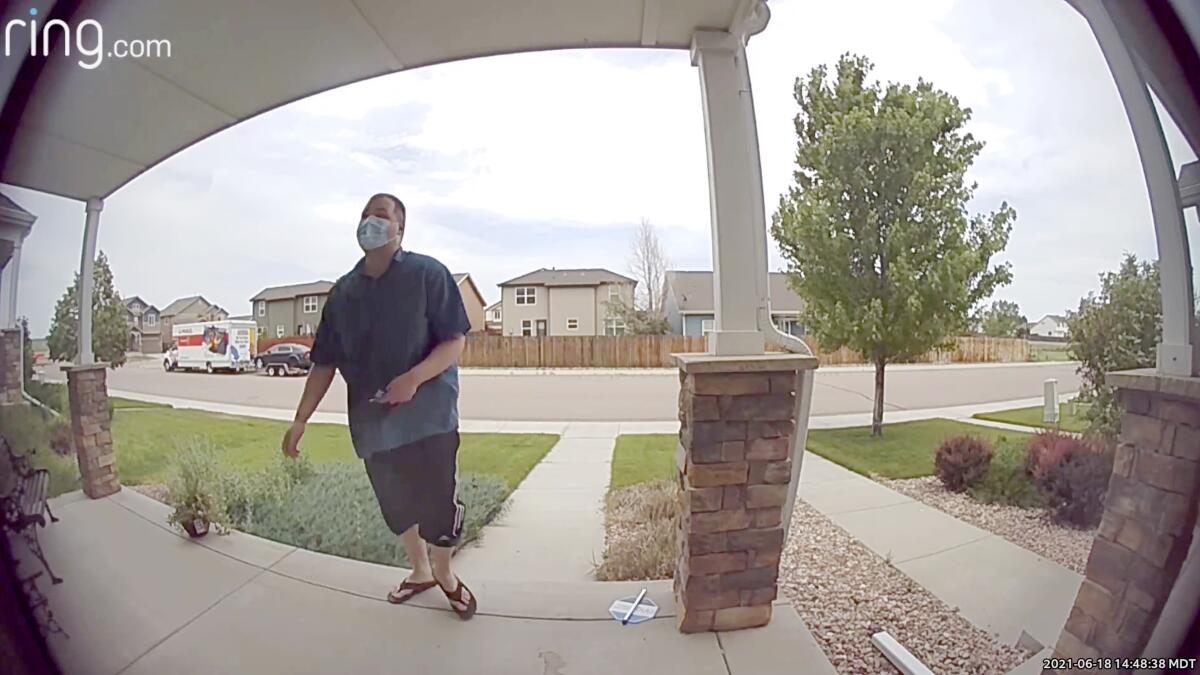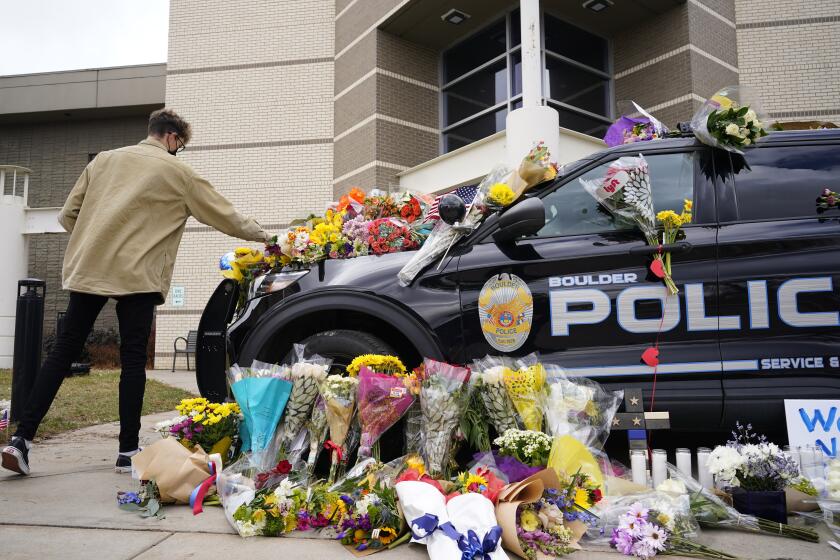Suspect in Colorado gay club attack appears to have escaped state’s ‘red flag’ gun law

- Share via
DENVER — A year and a half before he was arrested in the Colorado Springs gay nightclub shooting that left five people dead, Anderson Lee Aldrich allegedly threatened his mother with a homemade bomb, forcing neighbors to evacuate while the bomb squad and crisis negotiators talked him into surrendering.
Yet despite that scare, there’s no public record that prosecutors moved forward with felony kidnapping and menacing charges against Aldrich, or that police or relatives tried to trigger Colorado’s “red flag” law, which would have allowed authorities to seize the weapons and ammunition that Aldrich’s mother says he had with him.
Gun-control advocates say Aldrich’s alleged June 2021 threat is an example of a red flag law ignored, with potentially deadly consequences. While it’s not clear that the law could have prevented Saturday night’s attack — such gun seizures can be in effect for as short a time as two weeks and be extended by a judge in six-month increments — they say it could have at least slowed Aldrich and raised his profile with law enforcement.
Colorado Authorities said Sunday that a gunman who opened fire at a gay nightclub in Colorado — killing five and injuring 25 — was subdued by “heroic” patrons who hit him with his own gun.
“We need heroes beforehand — parents, co-workers, friends who are seeing someone go down this path,” said Colorado state Rep. Tom Sullivan, whose son was killed in the 2012 Aurora movie theater shooting and who sponsored the state’s red flag law, which was passed in 2019. “This should have alerted them, put him on their radar.”
The law, which allows guns to be removed from people deemed dangerous to themselves or others, has seldom been used in the state, and particularly not in El Paso County, home to Colorado Springs, where police say the 22-year-old Aldrich went into Club Q just before midnight and opened fire before being subdued by patrons.
An Associated Press analysis found that Colorado has one of the lowest rates of red flag law usage, despite widespread gun ownership in the state and several high-profile mass shootings.
The Uvalde gunman and the Buffalo suspect were just 18 when they bought their weapons. Too young to buy cigarettes but old enough to arm themselves to the hilt.
Courts issued 151 gun-surrender orders from the time the law took effect in April 2019 through 2021. That’s just three surrender orders for every 100,000 adults in the state, and one-third the average ratio in the 19 states and Washington, D.C., that have red flag laws on their books.
El Paso County appears especially hostile to the law. It joined nearly 2,000 counties nationwide that declared themselves “2nd Amendment Sanctuaries,” and passed a 2019 resolution saying that the red flag law “infringes upon the inalienable rights of law-abiding citizens” by ordering police to “forcibly enter premises and seize a citizen’s property with no evidence of a crime.”
County Sheriff Bill Elder has said his office would wait for family members to ask a court for surrender orders and not petition for them on its own accord, unless there were “exigent circumstances” and “probable cause” of a crime.
El Paso County, with a population of 730,000, had 13 temporary firearm removals through the end of last year, four of which turned into longer ones of at least six months.
No doubt you’ve had the thought: What would I do if faced with an active shooter? Here are some strategies to think about.
The sheriff’s office declined to say what happened after Aldrich’s arrest last year, including whether anyone asked to have his weapons removed. The news release issued by the sheriff’s office at the time said no explosives were found but did not mention anything about whether any weapons were recovered.
Sheriff’s spokesperson Lt. Deborah Mynatt referred further questions about the case to the district attorney’s office.
An online court records search did not turn up any formal charges filed against Aldrich in last year’s case. And in an update on a story on the bomb threat, Colorado Springs’ Gazette newspaper reported that prosecutors did not pursue any charges in the case and that records were sealed.
The Gazette also reported Sunday that it got a call from Aldrich in August asking that it remove a story about the incident.
Don’t make mental illness the bogeyman of mass shootings. It gets in the way of preventing attacks like the one at the Buffalo, N.Y., supermarket.
“There is absolutely nothing there, the case was dropped and I’m asking you either remove or update the story,” Aldrich said in a voice message to an editor. “The entire case was dismissed.”
A spokesperson for the district attorney’s office, Howard Black, declined to comment on whether any charges were pursued. He said the shooting investigation would include a study of the bomb threat.
“There will be no additional information released at this time,” Black said. “These are still investigative questions.”
AP’s study of the jurisdictions with red flag laws found that the laws have been invoked about 15,000 times since 2020 — fewer than 10 times for every 100,000 adults in each state. Experts called that woefully low and hardly enough to make a dent in gun killings.
Start your day right
Sign up for Essential California for the L.A. Times biggest news, features and recommendations in your inbox six days a week.
You may occasionally receive promotional content from the Los Angeles Times.
Just this year, authorities in Highland Park, Ill., were criticized for not trying to take guns away from the 21-year-old accused of a Fourth of July parade shooting that left seven dead. Police had been alerted to him in 2019 after he threatened to “kill everyone” in his home.
Duke University sociologist Jeffrey Swanson, an expert in red flag laws, said the Colorado Springs case could be yet another missed warning sign.
“This seems like a no-brainer, if the mom knew he had guns,” he said. “If you removed firearms from the situation, you could have had a different ending to the story.”
More to Read
Sign up for Essential California
The most important California stories and recommendations in your inbox every morning.
You may occasionally receive promotional content from the Los Angeles Times.

















